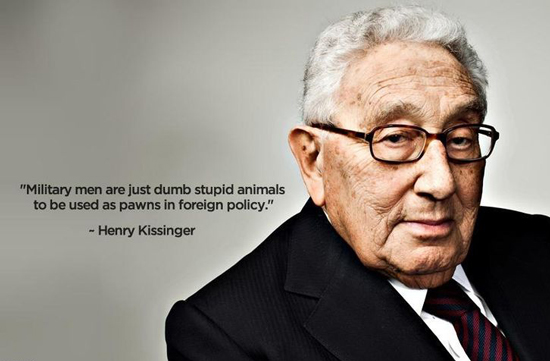Kissinger Warns ‘Pre-Emptive Attack’ Against North Korea ‘Is Strong’ Possibility

Former Secretary of State Henry Kissinger has said that he agrees with the aggressive statements President Trump has made towards North Korea back in September 2017.
At that time, the former Secretary of State urged for war, saying that the Trump Administration “will hit that fork in the road, and the temptation to deal with it with a pre-emptive attack” against North Korea “is strong, and the argument is rational.”
In the autumn of 2017, the Trump administration has signaled that North Korea would be crossing a red line if it developed nuclear capability for its intercontinental ballistic missile program. Yet some policy officials and military experts claimed that North Korea has already crossed that line, or is at least very close to attaching nuclear warheads to its missiles.
Kissinger offered his thoughts on the impending “fork in the road”, in which the administration may consider pre-emptive military action or increasingly tighter sanctions against the regime.
“We will hit that fork in the road, and the temptation to deal with it with a pre-emptive attack is strong, and the argument is rational, but I have seen no public statement by any leading official,” Nixon’s secretary of State told members of the Senate Armed Services Committee. “But in any event, my own thinking, I would be very concerned by any unilateral American war at the borders of China and Russia, in which we are not supported by a significant part of the world, or at least of the Asian world.”
The current North Korean trajectory, Kissinger continued, could lead to nuclear proliferation throughout Asia, as he believes South Korea will not accept being the only Korea without nuclear capability. Japan will follow suit, he said.
“Then we’re living in a new world, in which technically competent countries with adequate command structures are possessing nuclear weapons in an area where there are considerable national disagreements. That is a new world that will require new thinking by us.”
This would drive a rethinking of the entire U.S. nuclear deterrent posture, Kissinger said, as the current strategy assumes only one potential nuclear threat. One little country in North Korea does not pose such an extreme threat, Kissinger said, but the situation has the potential to evolve into a nuclear landscape the world has never seen.
At the time, Sen. Elizabeth Warren asked President Reagan’s Secretary of State George P. Shultz if he believes that the U.S. should further reduce its reliance on nuclear weapons. Schultz said a nuclear exchange would have “devastating” impacts on the planet, “so I continue to believe that we should be trying to eliminate them.”
“We were getting there for a while, and now that’s all stopped, and now our problem is proliferation, so this is a new problem we have to work out and work at it hard,” Schultz said.
Schultz also agreed with Kissinger’s recommendation that the U.S. attempt to start a serious dialogue with Russia, which the U.S. could expand to other countries and attempt to get a joint enterprise with the objective of eliminating nuclear weapons from the planet.
In response to Kissinger’s comments on North Korea, Schultz said that the U.S. needed to be “careful with red lines”. He added that when a solider points his weapon at an enemy, he’d better be ready to kill.
“Empty threats destroy you,” Schultz said.
He agreed with Kissinger’s recommendation that the U.S. work constructively to bring China and Russia to the table, mostly China, as it has greater influence over North Korea. Kissinger said the U.S. should be working closely with China to bring further sanctions and pressure against North Korea. Schultz pointed out that China has a declining population and GDP, which should make them more receptive to collaboration.
“That would be my preferred course, and on the other hand, if it turns out that neither is availing, then we better get used to the fact that South Korea, in my opinion, will not accept being the only Korea that has no nuclear weapon,” Kissinger said.
Earlier in the conversation, Kissinger said that a deal by the U.S. with North Korea to freeze its nuclear program means America legitimized North Korea’s military capability, which would encourage other countries in the region.
Kissinger also warned Congress against potential military intervention near Russian and Chinese borders without the world’s support.
Despite all Kissinger’s desperate efforts and push for war against North Korea, finally Trump decided to come to peace with the “little rocket man”.
yogaesoteric
February 16, 2019
